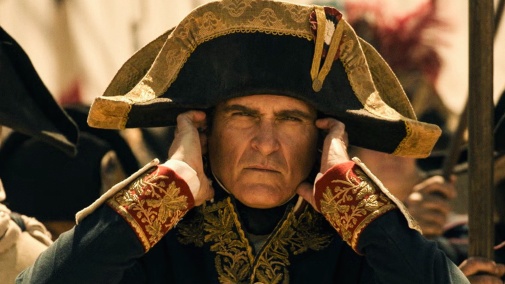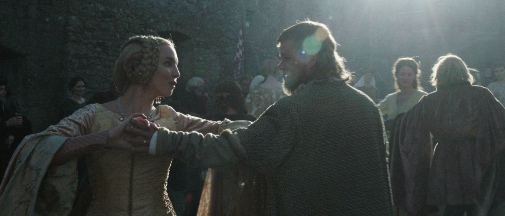Ridley Scott vs. History
 Saturday, November 25, 2023 at 10:00PM
Saturday, November 25, 2023 at 10:00PM 
With Napoleon in theaters, Ridley Scott's on a rampage – or what most people call it, a press tour. The 85-year-old director is out of fucks to give, throwing shade at historians left and right, not to mention the entire population of France. If the French can't like themselves, how in the hell are they gonna like Scott's latest movie? Ruisms aside, the filmmaker's wrath has been primarily directed at those who dare come to his cinema expecting a modicum of historical accuracy. Simply put, that's not where Sir Ridley's interests lie, as he's fond of reminding his critics.
But then, why does he keep throwing himself at historical narratives? The conundrum got me thinking about his vast and vastly inconsistent filmography…

After watching Napoleon and looking back at the director's debut, The Duelists, it becomes evident how much Barry Lyndon has weighed on his work. The Stanly Kubrick period piece came out during Scott's transition from advertising to film and obviously left an impression. In interviews, he's confirmed that the look of his first feature was heavily influenced by the Oscar-winning cinematography Kubrick devised with John Alcott. Moreover, both productions share near-obsessive attention to detail, as if their makers wanted to turn the screen into time travel machines, recreating days of old with archeological precision.
Indeed, military historian Richard Holmes played a crucial part in the making of The Duelists. But of course, a novice cineaste wouldn't have the same mastery or resources as Stanley Kubrick at the height of his powers, so there's quite the gulf between the two movies. That's not to diminish Scott's achievement – he did win the Camera d'Or at Cannes, after all – but a needed context into his trajectory. I say this because, after The Duelists, he seems to have given up on the very concept of historical verisimilitude in cinema.
In some regards, this follows the same conclusions of Barry Lyndon, that as much as the past informs the present, the people of today are essentially disconnected from those of yesterday. Only Kubrick explored this dynamic by reconstructing history to the point of alienation. Ridley Scott tends to take the exact opposite approach. Post Duelists, he's a fan of modernizing styles and customs, leaning on anachronism for an experience that prizes spectacle over historical truth. Consider the epic sensibilities of 1492: Conquest of Paradise, where Columbus' arrival to the New World is scored to Vangelis electronics.

Remember how Gladiator gestured at history without engaging with it, romanticizing its figures and setting until they had little resemblance to what might have been, gritty as they may look. Kingdom of Heaven is Scott's post-9/11 opus, where the Third Crusade is a prism through which the artist and his audience could reflect upon their shared now. Arriving in the 2010s, it seemed Scott was ready to take a step further in his divorce from the history books – a very counter-intuitive step, it must be said. Rather than simply mythifying history, the director was now working to history-fy myth.
In Robin Hood and Exodus: Gods and Kings, he applies an aesthetic of muddied roughness to the legend of the heroic outlaw and the story of Moses, reaching for a brand of realism that never goes beyond surface-level stuff. Even the casting of the latter picture is preposterously anachronistic, white-washing with no rhyme or rule, betraying the audiovisual philosophy to guarantee star power and the big budget that comes with it. Though less apparent, these same situations repeat in the director's 20th-century-set period pieces, from White Squall's shallow prodding of Cold War context to House of Gucci's melodrama on the verge of camp.

If only Scott's disregard for history meant his works were high-octane spectaculars like similar projects in the annals of Old Hollywood. Sadly, they tend to be pretty stodgy, as lacking in theme and entertainment as they are in their conversations with history. They're not bold either, opting for an air of faux authenticity that crumbles whenever you look too long into it. There are a few exceptions to the rule, of course. Gladiator mostly succeeds in its old-fashioned thrills with a veneer of newness, while the Kingdom of Heaven director's cut is among Scott's best efforts. And then there's The Last Duel, the Englishman's most underrated film of recent vintage.
The script's triadic structure is undoubtedly his most ambitious in a while, as are the ways in which Scott differentiates the character's diverging perspectives. His use of sound is especially inspired, and the performances he gets out of the cast deserve applause, as out-of-place as some might seem in 14th century France. As history, it's hogwash. But there's value to it as cinema. And as a film lover, first and foremost, I tend to value that higher than the adherence to documented fact. If Napoleon fails, its failure goes beyond inaccuracy, even if questioning Scott's many swerves away from the record isn't out of the question either.

The reasons behind the script's historical switches are endlessly fascinating, especially when the dramatic purpose behind them isn't clear. In the end, Scott doesn't seem to have much to say about the figures he's chosen to depict, nor the military and political dimension of their actions across three decades of tumultuous world change. On the one hand, the "print the legend" take on the battles produces some exciting moments, robust and rip-roaring in shades of grey with a dash of blood. On the other hand, the picture's depiction of Napoleon and Josephine's marriage is where its most daring tonal variations manifest.
Their bond is prickly and often bizarre, buttressed by odd acting strategies from Joaquin Phoenix and Vanessa Kirby alike. Why not spend more time with them, then? Especially Kirby, who feels shortchanged by the edit. Frustrations piling high, one realizes that nothing in the movie feels like it's given enough time to cook. Despite clocking at 158 minutes, Napoleon comes off too short, showing a lot of snippets that could be interesting if they were given the chance. But they mostly aren't. As ever with Scott, one can only hope that the director's cut will improve the structural coherence of the thing.
The single aspect where the director succeeds with no obvious caveats is the twist on Napoleon's legacy. While evoking the famous portraits and their epic nature, Scott also strips the images and narrative of their grandeur. By weaponizing humor and anti-charisma, the filmmakers portray the "great man" as an angry fool, prone to stupidity and belligerence. It's not so much a dissection of the historical man as a subversion of our contemporary understanding of him. Obviously, it's not much of a conversation with history, but at this point, it's a waste of time to expect anything else from Sir Ridley Scott.

Where do you fall in this historical debate? Should a movie like Napoleon be concerned with accuracy? More importantly, does Scott's approach work for you?



Reader Comments (5)
To answer the first question, I 100% do not think that movies should be concerned with accuracy. Unless it is a documentary. Otherwise no, the director should have free rein to make whatever film they want. People getting upset about inaccuracies of Hollywood historical epics is, to me, no different than those people that read Twitter for current event news stories and then find out it was all made up. Unless there was a statement at the end of the film that everything is totally accurate, I would never just assume “Gee I guess every detail of that real life event just happened to be perfectly cinematic with no embellishments needed”. If you want to find out what really happened, go to an actual news site, read a non fiction book, watch a documentary or talk to people that are first account witnesses. I have been seeing some similar comments about the Netflix movie Nyad not being totally accurate and I’m like “You guys, it’s a movie! This is not a source document! It’s just an entertaining film!”
I think it depends on the subject and what a filmmaker wants to say. Being a history buff, I try not to think about historical accuracy sometimes as it relates to what a director is trying to say which is why I can enjoy something like Marie Antoinette and The Last Emperor being that they're character studies or something like The New World or The Motorcycle Diaries.
Then you get something like Pearl Harbor as I liken it to a history term paper that gets everything absolutely wrong as that is to me, the worst film ever made. Even if you're not fully aware of the subject matter, there are things in that film that rubbed me the wrong way in terms of historical accuracy as I go "wait a minute, that didn't happen" as that kills the film for me. Something that I was experiencing when I watched Bohemian Rhapsody or any other bio-pics as that kills whatever enjoyment I can get for a film.
Movies certainly don't have to be 100% accurate; after all, they are a form of artistic imagination. However, they should at least clarify this in the synopsis and not position themselves as historical, real events, etc. because the general audience often doesn't know history and ultimately bases their knowledge on what they see in the cinema. In movies, there can be assumptions, of course, but they shouldn't completely contradict logic, physics, and common sense. Directors need to listen more to scriptwriters and fact-check the information they present. I once read an interview with a science fiction writer, and he mentioned that while writing a new book, he often participates in scientific forums and personally communicates with specialists in a particular field. However, for the sake of visual appeal, directors often disregard these efforts.
I agree with what thevoid99 is saying. If the filmmaker isn't trying to be historically accurate, it's fine not to be. Often it can be better! Nothing against Anthony Mann's The Fall of the Roman Empire (which is quite fine for what it is) but Gladiator clearly not giving a f- about the real history really opens it up. But if they are falling all over themselves to recreate history, it is distracting when there are lots of historical inaccuracies. Here, often there isn't so much dialogue as there is exposition about historical events - for hours on end - and weird flash forwards because he wants to present so many of these key events, whether it's acts of peace (Tilsit) or war (Borodino, etc.). And as history, this is pretty bad. That's not the only failure of this film, but it's a notable one.
Kind of wish he'd just gone with a Gladiator approach to this one. Sometimes just going for a tone has worked for him (I think White Squall is underrated).
Great job for publishing such a beneficial website. The article is not only useful but also really creative. Play fall guys for free!